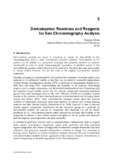| dc.description.abstract | Derivatization reactions are meant to transform an analyte for detectability in Gas Chromatography (GC) or other instrumental analytical methods. Derivatization in GC analysis can be defined as a procedural technique that primarily modifies an analyte’s functionality in order to enable chromatographic separations. A modified analyte in this case will be the product, which is known as the derivative. The derivative may have similar or closely related structure, but not the same as the original non-modified chemical compound. Volatility of sample is a requirement for GC analysis. Derivatization will render highly polar materials to be sufficiently volatile so that they can be eluted at reasonable temperatures without thermal decomposition (Knapp, 1979) or molecular re-arrangement (Kühnel et al., 2007; Blau and King 1979). Understanding the chemistry of the analytes, derivatizing reagents used in sample preparation, and the detailed functionality of Gas Chromatography are important to get reliable results. For GC analysis, compounds containing functional groups with active hydrogens such as -SH, -OH, -NH and -COOH are of primary concern because of the tendency of these functional groups to form intermolecular hydrogen bonds (Zaikin and Halket, 2003). These intermolecular hydrogen bonds affect the inherent volatility of compounds containing them, their tendency to interact with column packing materials and their thermal stability (Sobolevsky et al., 2003). Since GC is used to separate volatile organic compounds, modification of the functional group of a molecule by derivatization enables the analysis of compounds that otherwise can not be readily monitored by GC. Derivatization process either increases or decreases the volatility of the compound of interest. It also reduces analyte adsorption in the GC system and improves detector response, peak separations and peak symmetry. In addition to particular analytes such as pharmaceuticals, biomolecules such us organic acids, amides, poly-hydroxy compounds, amino acids, pesticides and other persistent organic compounds, new classes of compounds of interest for example fluorinated alkylated substances and polycyclic aromatic hydrocarbons continue to emerge. It is necessary to develop and/or improve on chemical analytical methods and hence the need to familiarize with derivatization methods that are applicable to GG analysis. Generally derivatization is aimed at improving on the following aspects in Gas Chromatography | en_US |

